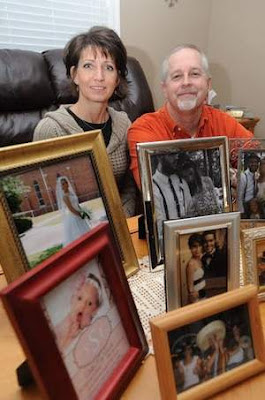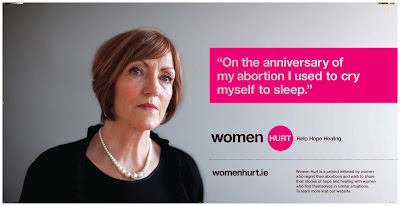Post-Abortion syndrome is a form of post-traumatic stress disorder. The process of making an abortion choice, experiencing the procedure and living with the grief, pain and regret is certainly, at its very core, traumatic. As with any trauma, individuals often try to "forget" the ordeal and deny or ignore any pain that may result. Many simply don't relate their distress to the abortion experience. At some point, however, memories resurface and the truth of this loss can no longer be denied. During these moments, the pain of post-abortion syndrome reveals itself in the hearts of millions of lives.

The symptoms of post abortion syndrome will not necessarily appear at the same time, nor is likely that any woman will experience the entire list. Some may occur immediately after an abortion and others much later. If you can identify with more than two of these symptoms, it could be that you are experiencing post-abortion syndrome.
Below are the symptoms that describe post-abortion syndrome, as described by Dr. Paul and Teri Reisser in their book, Help for the Post-Abortive Woman (now entitled A Solitary Sorrow):
1. Guilt. Guilt is what an individual feels when she has violated her own moral code. For the woman who has come to believe, at some point either before or after the abortion, that she consented to the killing of her unborn child, the burden of guilt is relentless. There is little consolation to offer the woman who has transgressed one of nature's strongest instincts: the protection a mother extends to her young. In fact, many post-abortive women believe that any unhappy events that have occurred since the abortion were inevitable because they "deserve it."
2. Anxiety. Anxiety is defined as an unpleasant emotional and physical state of apprehension that may take the form of tension, (inability to relax, irritability, etc.), physical responses (dizziness, pounding heart, upset stomach, headaches, etc.), worry about the future, difficulty concentrating and disturbed sleep. The conflict between a woman's moral standards and her decision to abort generates much of this anxiety. Very often, she will not relate her anxiety to a post-abortion syndrome abortion, and yet she will unconsciously begin to avoid anything having to do with babies. She may make excuses for not attending a baby shower, skip the baby aisle at the grocery store and so forth.
3. Psychological "numbing." Many post-abortive women maintain a secret vow that they will never again allow themselves to be put in such a vulnerable position. As a result, often without conscious thought, they may work hard to keep their emotions in tight check, preventing themselves from feeling the pain of what has happened, but also greatly hampering their ability to form and maintain close relationships. Cut off even from themselves, they may feel as though their lives were happening to another person.
4. Depression and thoughts of suicide. All of us experience depression from time to time, but the following forms of it are certainly common in women who have experienced abortion:
Sad mood--ranging from feelings of melancholy to total hopelessness.
Sudden and uncontrollable crying episodes--the source of which appear to be a total mystery.
Deterioration of self-concept--because she feels wholly deficient in her ability to function as a "normal" woman. Sleep, appetite, and sexual disturbances--usually in a pattern of insomnia, loss of appetite and/or reduced sex drive.
Reduced motivation--for the normal activities of life. The things that occupied her life before the depression no longer seem worth doing.
Disruption in interpersonal relationships--because of the general lack of enthusiasm for all activities. This is especially evidenced in her relationship with her husband or boyfriend, particularly if he was involved in the abortion decision.
Thoughts of suicide--or preoccupation with death. Not surprisingly, in a study done by the Elliot Institute some 33% of post-abortive women surveyed reached a level of depression so deep that they would rather die than go on.
5. Anniversary syndrome. In the survey reference previously, some 54% of post-abortive women report an increase of post-abortion syndrome symptoms around the time of the anniversary of the abortion and/or the due date of the aborted child.
6. Re-experiencing the abortion. A very common event described by post-abortive women is the sudden distressing, recurring "flashbacks" of the abortion episode, often occurring during situations that resemble some aspect of the abortion, such as a routine gynecological exam, or even the sound of a vacuum cleaners suction. "Flashbacks" also occur in the form of recurring nightmares about babies in general or the aborted baby in particular. These "dreams" usually involve themes of lost, dismembered or crying babies.
7. Preoccupation with becoming pregnant again. A significant percentage of women who abort become pregnant again within one year, and many others verbalize the desire to conceive again as quickly as possible. The new baby, sometimes referred to as the "atonement baby," may represent an unconscious desire to replace the one that was aborted.
8. Anxiety over fertility and childbearing issues. A common post abortion syndrome symptom in women is a fear that they will never again become pregnant or be able to carry a pregnancy to term. Some expect to have handicapped children because they have "disqualified themselves as good mothers." Many refer to these fears as punishments from God.
9. Interruption of the bonding process with present and/or future children. Fearing another devastating loss, a post-abortive woman may not allow herself to truly bond with other children. Another common reaction is to atone for her actions toward the aborted child by becoming the world's most perfect mother to her remaining or future children. Likewise, the woman who already had children at the time of her abortion may discover that she is beginning to view them in a different light. At one extreme, she may unconsciously devalue them, thinking things like, "you were the lucky one. You were allowed to live." Or she may go in the opposite direction and become overly protective.
10. Survival guilt. Most women do not abort for trivial reasons. They are usually in the midst of a heartbreaking situation whereby they stand to lose much if they choose to carry their pregnancies to term. In the end, the decision boils down to a sorrowful "It's me or you, and I choose me." But while the abortion frees them from their current trauma, it frequently produces in them an unrelenting guilt for choosing their own comfort over the life of the child.
11. Development of eating disorders. Some post-abortive women developed anorexia or bulimia. While this phenomenon remains largely unexplored at this time, several factors may contribute to it. First, a substantial weight gain or severe weight loss is associated with unattractiveness, which reduces the odds of becoming pregnant again. Second, becoming unattractive serves as a form of self-punishment and helps perpetuate the belief that the woman is unworthy of anyone's attention. Third, extremes in eating behavior represent a form of control for the woman who feels her life is totally out of control. And finally, a drastic weight loss can shut down the menstrual cycle, thus preventing any future pregnancies.
12. Alcohol and drug abuse. Alcohol and drug use often serve initially as a form of self-medication--a way of coping with the pain of the abortion memories. Sadly, the woman who resorts to alcohol and/or drugs eventually finds herself having not only more problems but also fewer resources with which to solve them. The mental and physical consequences of alcohol or drug abuse only amplify most of the symptoms the woman is already experiencing.
13. Other self-punishing or self-degrading behaviors. In addition to eating disorders and substance abuse, the post-abortive woman may also enter in abusive relationships, become promiscuous, and fail to take care of herself medically or deliberately hurt herself emotionally and/or physically.
14. Brief reactive psychosis. Rarely, a post-abortive woman may experience a brief psychotic episode for two weeks or less after her abortion. The break with reality and subsequent recovery are both extremely rapid, and in most cases the person returns completely to normal when it is over. While this is an unusual reaction to abortion, it bears mentioning only because it is possible for a person to have a brief psychotic reaction to a stressful even without being labeled a psychotic individual. During such and episode, the individual's perception of reality is drastically distorted. These individuals should be referred to the care of a professional.
There are many other angles of post-abortive pain. But for everyone who has chosen abortion -- regardless of the circumstances surrounding this decision and number of abortions -- there is good news! Thousands of us who have chosen abortion have found healing when we finally stopped running from these memories. The same peace that I have found is available for you!
For most individuals, abortion is a closely held secret. Rarely do we talk about this pain with family or friends. This is because of feelings like fear of judgment, guilt, shame and grief. In reading this article you have taken a step of great courage. My prayer is that this won't be your first step but the beginning of a journey that will lead to restoration and healing.
Ramah International, Inc. was founded by Sydna A. Masse, a post-abortive woman who experienced God's healing touch eleven years after her abortion through a crisis pregnancy center's ministry program. Upon hearing a recent statistic from the research arm of the largest abortion provider in the world that "... 43% of women will experience abortion at least once by the age of 45 years," she began efforts to minister directly to these hearts.
 Women are particularly good at guilt. Having an abortion goes against our biological need to procreate. One of our expected roles in life is to mother and nurture. So to have an abortion is counter to that role that society expects of us.
Women are particularly good at guilt. Having an abortion goes against our biological need to procreate. One of our expected roles in life is to mother and nurture. So to have an abortion is counter to that role that society expects of us.





